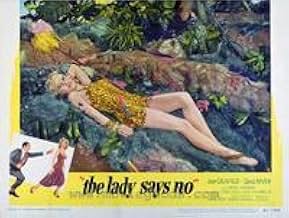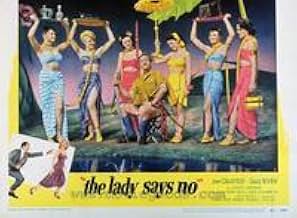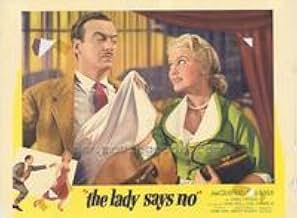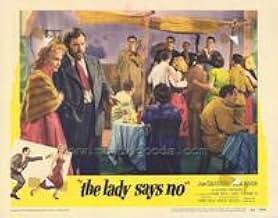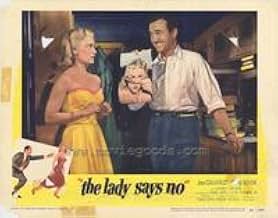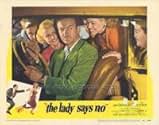Ajouter une intrigue dans votre langueA woman writes a best-selling book for women warning them about the "dangers" of men. A handsome photographer for a national magazine arrives in her town to do a feature story on her. Compli... Tout lireA woman writes a best-selling book for women warning them about the "dangers" of men. A handsome photographer for a national magazine arrives in her town to do a feature story on her. Complications ensue.A woman writes a best-selling book for women warning them about the "dangers" of men. A handsome photographer for a national magazine arrives in her town to do a feature story on her. Complications ensue.
- Réalisation
- Scénario
- Casting principal
- Maj. Gen. Horatio W. Schofield
- (as Robert Williams)
- Minor Role
- (non crédité)
- Minor Role
- (non crédité)
- Woman at Meeting
- (non crédité)
- Minor Role
- (non crédité)
- Minor Role
- (non crédité)
- Minor Role
- (non crédité)
- Brawler
- (non crédité)
Avis à la une
Joan has written the title book, which argues for women to stand up for themselves in a male-dominated society. She's thrown together with a self-assured Life magazine photographer played by Niven, whose innate charm makes his chauvinistic attitudes tolerable, with zero doubt that they will move past detente to become a loving couple by film's end.
Adding quite a bit to the movie's impact is the subsidiary storyline involving Joan's aunt Frances Bavier and her estranged Scots husband James Robertson Justice, a real chauvinist pig. Casting that team seems unlikely, but this pair of opposites are delightful in their bickering, with Justice's comedy flair (staring in many a British comedy of the Fifties) on display.
I've been watching David Niven demonstrating his acting versatility a few years later on "Four Star Playhouse", and his nimble comedy reactions help lift "The Lady Says No". Kudos also to the great James Wong Howe's distinctive camerawork. Watch for some strange little touches by director Frank Ross, including a goofy dream sequence and a "jump and jive" Black girl dancing around in a hallway.
The film has a lackluster script. Caulfield does the best she can with the part but Niven appears just plain bored as if he has mentally checked out from this trite material.
One thing about it is that it reminds people of how feminism made a strange turn in the 1970s. Giving up on the idea of persuading women en mass to eschew intimate relations with men, feminism adopted legalized abortion as its cause. Obviously, abortion would have little market if it were really possible to get women to "say no."
Although the film isn't terrific, IT SHOULD BE WATCHED! It should be watched to see what people in the 1950s thought a feminist would look like and be like and what feminism would champion. Does anyone in this era think a feminist is a dowdy stout woman in a long dress who stays home and knits? As I've already pointed out, a feminist movement that successfully championed celibacy would not be tied to "abortion rights."
I want to add that I saw this routine programmer because I'm a fan of the relatively little-known Peggy Maley, the blonde beauty cast as Midge. I thought Maley did well with her lively but small part. She certainly looked sexy and bright but she almost always did. Here's to Peggy!
Niven was a photographer, Joan Caufield was some independent female who had to challenge him about a woman's independence. Huh? A photograph of her crossing her eyes and pulling a lock of her hair across her upper lip like a moustache was supposed to be embarrassing and he put it on the cover of a magazine. Really odd movie and such a waste of David Niven. I have seen him salvage other movies. Alas, this one he could not. The film was a showboat for Caufield, and she couldn't be more uninteresting if she tried.
One very amusing moment was Niven having a dream about Caufield and she is dressed like Sheena of the Jungle in a leopard print one piece swimsuit. Very bohemian! Think of Madonna of '52. The wooden gyrations are laughable to begin with, but just before this scene, we're shown an unamed African American woman who was the towel girl (!) at the restaurant and her dancing to the band's music was priceless. This chick really cut loose! I thought it was tremendously odd that this woman was uncredited and danced so much more better than Caufield, and that her scene would precede Caufield's big dance moment. Avoid this flick at all costs, unless you are an overwhelming David Niven fan, as I am. This was not one of his best.
Also in the cast are Francis Bavier (Aunt Bee-The Andy Griffith Show), James Robertson Justice, Henry Jones, Lenore Lonergan, and Peggy Malley, with Bavier and Justice as Caulfield's aunt and uncle, Jones and Lonergan as a military couple, and Malley as a friend of the military couple.
Mostly hilarious and predictable (Caulfield's dream of her fighting off jungle women to get to Niven), but stoic in some areas (Niven's lack of comic response), the film was written as a showpiece for Caulfield, who carried the movie. Wouldn't mind seeing it again. In other words, I would love to see Caulfield flaunt her style in Orry-Kelly fashions, while she defends her position of feminism, while a different actor could have been used as a comic foil, maybe Fred MacMurray. A film slightly ahead of its time.
Niven seems TOTALLY OUT OF PLACE, a part someone like Tony Randall or Jack Lemmon could have banged out of the park (maybe it was a bit before their time...) Not a bad premise, has been stolen and used repeatedly in movie history, but it seems listless and lifeless when Niven is on screen. Oh, well.
Le saviez-vous
- AnecdotesBarbara Carroll's debut.
- GaffesJames R. Justice's accent keeps switching between (his authentic) Scottish and Irish.
- Citations
Dorinda Hatch: Well, what makes HER so important ?
Potsy: She don't take no "stuff" from nobody... unless she wants to. Then she takes anything that isn't nailed down.
Dorinda Hatch: Well, I think it's disgusting. Why any woman could get a man like that if she wanted to. I know I could... couldn't I ?
Potsy: You don't have the stuff it takes to take the stuff you don't have.
- Crédits fousThe opening credits show a woman's hands opening a gift card from a fancily wrapped present, which starts the credits. The next shot is the opening of the gift itself, which turns out to be a book with the title of the movie (based on a book a female author writes).
Meilleurs choix
- How long is The Lady Says No?Alimenté par Alexa
Détails
- Durée1 heure 20 minutes
- Couleur
- Rapport de forme
- 1.37 : 1
Contribuer à cette page


